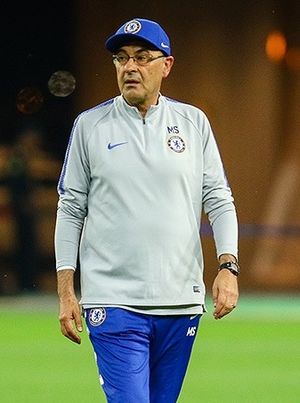Maurizio Sarri facts for kids
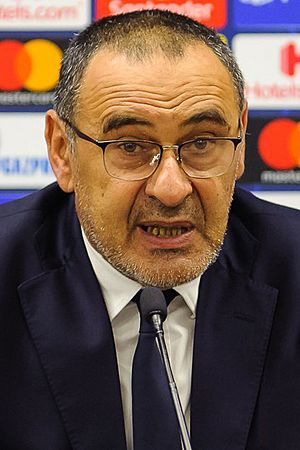
Sarri as Juventus manager in 2019
|
|||
| Personal information | |||
|---|---|---|---|
| Full name | Maurizio Sarri | ||
| Date of birth | 10 January 1959 | ||
| Place of birth | Naples, Italy | ||
| Height | 1.90 m (6 ft 3 in) | ||
| Position(s) | Centre-back | ||
| Team information | |||
|
Current team
|
Lazio (head coach) | ||
| Senior career* | |||
| Years | Team | Apps | (Gls) |
| Figline | |||
| Managerial career | |||
| 1990–1991 | Stia | ||
| 1991–1993 | Faellese | ||
| 1993–1996 | Cavriglia | ||
| 1996–1998 | Antella | ||
| 1998–1999 | Valdema | ||
| 1999–2000 | Tegoleto | ||
| 2000–2003 | Sansovino | ||
| 2003–2005 | Sangiovannese | ||
| 2005–2006 | Pescara | ||
| 2006–2007 | Arezzo | ||
| 2007 | Avellino | ||
| 2007–2008 | Verona | ||
| 2008–2009 | Perugia | ||
| 2010 | Grosseto | ||
| 2010–2011 | Alessandria | ||
| 2011–2012 | Sorrento | ||
| 2012–2015 | Empoli | ||
| 2015–2018 | Napoli | ||
| 2018–2019 | Chelsea | ||
| 2019–2020 | Juventus | ||
| 2021–2024 | Lazio | ||
| 2025– | Lazio | ||
| *Club domestic league appearances and goals | |||
Maurizio Sarri (Italian pronunciation: [mauˈrittsjo ˈsarri]; born 10 January 1959) is an Italian professional football manager. He is currently the head coach of Serie A club Lazio.
Sarri did not play football professionally. He played as an amateur centre back and coached teams while working as a banker. In 2005, he got his first job in Serie B with Pescara. In 2014, Sarri helped Empoli get promoted to Serie A, Italy's top football league. After keeping them in Serie A, he was hired by Napoli.
He won several awards while managing Napoli. After finishing second in the league in 2018, Sarri moved to the English club Chelsea. There, he won the UEFA Europa League in his only season. He returned to Italy in 2019 to coach Juventus. With Juventus, he won the Serie A title in his first season. He became the oldest manager to ever win the Serie A. After leaving Juventus, he became manager of Lazio in 2021. He resigned in 2024 but returned as Lazio's manager in June 2025.
Contents
Sarri's Early Life and Football Journey
Maurizio Sarri grew up in Italy. His father, Amerigo, was a former professional cyclist. He worked as a crane operator. Sarri spent his early life in different towns, including Castro and Faella. During this time, he balanced playing amateur football with working as a banker. His banking job took him to cities like London, Zürich, and Luxembourg.
Sarri played as a centre back for his local team, Figline. He tried out for bigger clubs like Torino and Fiorentina but didn't get signed. At 19, Montevarchi wanted to sign him. However, Figline asked for a large fee, and the deal fell through. He later retired from playing with Figline due to injuries.
Sarri used to work at the bank in the mornings. Then, he would train and play football in the afternoons and evenings. In 1990, at 28, he started coaching. He kept the same busy schedule. After getting a job with a small team called Tegoleto, he decided to quit his banking career. He wanted to focus only on coaching.
Sarri's Managerial Career
Starting Out in Coaching
Sarri's first coaching job was with Stia in 1990. The next year, he managed Faellese and helped them move up a league. He then coached Cavriglia and Antella, guiding both teams to higher divisions. In 2000, Sarri joined Sansovino. In his first season, he led them to promotion to Serie D. He stayed for two more seasons, even reaching the play-offs.
His success with Sansovino led Serie C2 team Sangiovannese to sign him in 2003. He spent two seasons there, helping them reach Serie C1. On 9 July 2005, Sarri became manager of Serie B club Pescara. He helped them avoid relegation. After leaving Pescara, he managed Arezzo and Avellino. He also had a short time at Hellas Verona.
In 2008, Sarri took over Perugia. He later coached Grosseto and Alessandria. With Alessandria, he reached the promotion play-offs. In 2011, he became manager of Sorrento. Despite the team playing well, he was dismissed in December.
Success with Empoli
On 25 June 2012, Empoli hired Sarri as their new coach. In his first season, he led the club to fourth place in Serie B. They reached the play-off final but lost to local rivals Livorno.
The next season, Sarri guided Empoli to second place. This meant they were directly promoted to Serie A after six years away. In the 2014–15 Serie A season, Empoli avoided relegation by finishing 15th.
Leading Napoli to New Heights
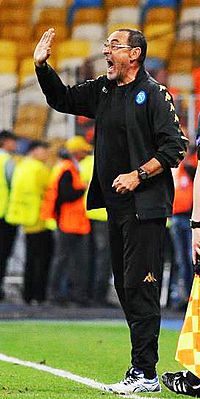
On 11 June 2015, Sarri left Empoli to manage Napoli, the club from his birth city. In his first season, Napoli finished second in Serie A, behind Juventus. Sarri extended his contract with Napoli until 2020.
Napoli's star player, Gonzalo Higuaín, moved to Juventus. Instead of buying a direct replacement, Sarri changed his team's tactics. He moved Dries Mertens, who was a wide-forward, to play more centrally. This worked very well, and Mertens scored 28 goals. Napoli finished third in 2017. Sarri was voted the league's coach of the year and received the Enzo Bearzot Award.
Sarri's Napoli team played exciting football. They were known for their attacking style. In the 2017–18 season, Napoli started incredibly well. They set a team record for most consecutive league wins. They finished the season in second place, just four points behind Juventus. On 23 May 2018, Sarri was replaced by Carlo Ancelotti.
Winning in England with Chelsea
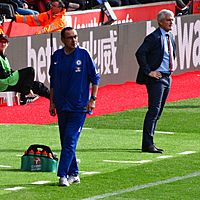
On 14 July 2018, Sarri became the head coach of Chelsea in England. His first game was the 2018 FA Community Shield, which Chelsea lost to Manchester City. The next week, he got his first win in a league match against Huddersfield Town. Sarri became the first coach to stay undefeated in his first 12 Premier League games.
During the 2019 EFL Cup Final against Manchester City, there was a misunderstanding with goalkeeper Kepa Arrizabalaga. Sarri wanted to substitute Kepa, but Kepa felt he could continue. Chelsea lost the match in a penalty shootout. On 29 May, Sarri won his first major trophy as a manager. Chelsea beat Arsenal 4–1 in the 2019 UEFA Europa League Final. Chelsea won the Europa League without losing a single game.
After the 2018–19 season, Chelsea announced that Sarri was leaving to manage Juventus. He wanted to be closer to his family in Italy.
Serie A Title with Juventus
On 16 June 2019, Juventus signed Sarri for three years. In August 2019, he was treated for pneumonia and missed the first two matches of the season.
Under Sarri, Juventus played in the 2019 Supercoppa Italiana on 22 December. They lost 3–1 to Lazio. On 17 June 2020, Juventus lost the 2020 Coppa Italia Final to Sarri's former club Napoli in a penalty shootout.
However, on 26 July, Juventus secured their ninth straight Serie A title. They won 2–0 against Sampdoria. This was Sarri's first major trophy in Italian football. On 8 August 2020, Sarri was sacked by Juventus after the team was knocked out of the Champions League.
Return to Lazio
After a year away from coaching, Lazio announced Sarri's appointment on 9 June 2021. He signed a two-year contract. On 21 August, he made his debut with a 3–1 league win over Empoli. Lazio finished fifth in the league that season. In the 2021–22 UEFA Europa League, they lost to Porto. On 2 June 2022, his contract was extended until 2025.
In his second season with Lazio, he improved their league position. They finished second in the 2022–23 Serie A table. This meant they qualified for the 2023–24 UEFA Champions League. However, they were eliminated from the 2022–23 UEFA Europa League and later the 2022–23 UEFA Europa Conference League. In his third season, Lazio reached the 2023–24 UEFA Champions League knockout phase. On 12 March 2024, Sarri resigned as head coach.
On 2 June 2025, after a 15-month break, Sarri was reappointed as Lazio's head coach. He signed another two-year contract.
Sarri's Coaching Style
Tactics and Strategy
Maurizio Sarri is known for being very smart and detailed in his coaching. He spends a lot of time preparing for matches during weekly training sessions. His teams often practice many different plays, especially from set-pieces. A key part of his system is a four-player defense line. His teams usually play with a high defensive line and use the offside trap. They also use a zonal marking system, where players cover areas instead of specific opponents.
Sarri wants his defenders to move together and watch the ball, not just their opponents. His teams also use a deep-lying playmaker. This player controls the game from in front of the defense, like Jorginho. He also likes full backs who run forward to help the attack. His players often attack from the sides, making quick passes and runs into the penalty box. They don't usually cross the ball into the area.
Sarri prefers fast wingers and defenders and goalkeepers who are good with the ball. This helps his team keep possession. He also likes hard-working players who can press high up the field. This helps them win the ball back quickly.
Sarri has used different formations, like the 4–3–1–2 or the 4–2–3–1. But he became famous for his "free-flowing, possession-based 4–3–3 system" at Napoli. In the 2016–17 season, after Gonzalo Higuaín left, Sarri often used Dries Mertens as a false nine. This meant Mertens played as a central forward instead of a winger. This change greatly increased Mertens' goal scoring.
Sarri got his coaching diploma in 2006. He is influenced by famous coach Arrigo Sacchi. Sarri is also known for being direct and for his unique style. Unlike many managers who wear suits, he usually wears a tracksuit during matches. At Chelsea, he was more relaxed than his previous coach about players' diets and curfews. This, along with his attacking style, helped create a positive team environment.
How People See His Style
"My goal is to have fun as long as I am here and be competitive in all competitions until the end. Ours is not a sport but a game, and anybody who plays a game starts doing that when they're young. It is fun. The child in each of us must be nurtured because this often makes us the best. I think if a team has fun often, the fans do too. This is very important, and then there are the high-level objectives, but we must start by having fun. This is important for us and our fans."
Sarri's teams are known for playing exciting, attacking football. They focus on keeping possession, moving without the ball, and making many quick, short passes. This style has been called "Sarri-ball" or "liquid football" by the media. The Italian encyclopedia Treccani even created the term "Sarrismo" to describe his offensive and spectacular football style.
Many experts, players, and managers, including Pep Guardiola, have praised Sarri's modern and creative playing style. They admire his teams' ability to move quickly on counter-attacks and score many goals. In 2018, former manager Arrigo Sacchi called Napoli's style under Sarri "the most important thing seen in Italy in the last 20 years."
However, Sarri was sometimes criticized for not winning trophies earlier in his career. This changed when he won the Europa League with Chelsea in 2019. He has also been called stubborn and sometimes unwilling to change his tactics.
Personal Life
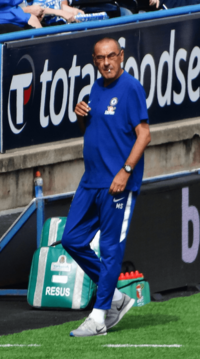
Maurizio Sarri is a heavy smoker. In 2018, when Napoli played against RB Leipzig in the UEFA Europa League, the German club built a special smoking area for him in their stadium's locker room. He is often seen chewing on cigarette butts while on the side-lines during matches.
Sarri speaks Italian, his native language. He also speaks English, though he sometimes uses an interpreter for interviews in English.
Managerial Statistics
| Team | From | To | Record | Ref. | ||||
|---|---|---|---|---|---|---|---|---|
| P | W | D | L | Win % | ||||
| Cavriglia | 1993 | 1996 | 78 | 27 | 27 | 24 | 34.62 | |
| Antella | 1996 | 1998 | 60 | 26 | 18 | 16 | 43.33 | |
| Valdema | 1998 | 1999 | 17 | 5 | 6 | 6 | 29.41 | |
| Tegoleto | 1 July 1999 | 30 June 2000 | 26 | 8 | 9 | 9 | 30.77 | |
| Sansovino | 1 July 2000 | 30 June 2003 | 120 | 62 | 33 | 25 | 51.67 | |
| Sangiovannese | 1 July 2003 | 18 June 2005 | 86 | 36 | 30 | 20 | 41.86 | |
| Pescara | 9 July 2005 | 30 June 2006 | 43 | 14 | 12 | 17 | 32.56 | |
| Arezzo | 31 October 2006 | 13 March 2007 | 22 | 6 | 8 | 8 | 27.27 | |
| Avellino | 18 July 2007 | 23 August 2007 | 1 | 0 | 0 | 1 | 0.00 | |
| Hellas Verona | 31 December 2007 | 28 February 2008 | 6 | 0 | 1 | 5 | 0.00 | |
| Perugia | 23 September 2008 | 15 February 2009 | 22 | 7 | 10 | 5 | 31.82 | |
| Grosseto | 24 March 2010 | 24 June 2010 | 11 | 2 | 7 | 2 | 18.18 | |
| Alessandria | 6 July 2010 | 24 June 2011 | 39 | 16 | 13 | 10 | 41.03 | |
| Sorrento | 6 July 2011 | 13 December 2011 | 19 | 8 | 6 | 5 | 42.11 | |
| Empoli | 12 August 2012 | 31 May 2015 | 132 | 52 | 45 | 35 | 39.39 | |
| Napoli | 12 June 2015 | 23 May 2018 | 148 | 98 | 25 | 25 | 66.22 | |
| Chelsea | 14 July 2018 | 16 June 2019 | 63 | 39 | 13 | 11 | 61.90 | |
| Juventus | 16 June 2019 | 8 August 2020 | 52 | 34 | 9 | 9 | 65.38 | |
| Lazio | 9 June 2021 | 12 March 2024 | 139 | 67 | 30 | 42 | 48.20 | |
| Lazio | 2 June 2025 | Present | 0 | 0 | 0 | 0 | — | |
| Total | 1,083 | 506 | 302 | 275 | 46.72 | |||
Honours and Awards
Team Honours
Sansovino
- Coppa Italia Serie D: 2002–03
Chelsea
Juventus
- Serie A: 2019–20
Individual Awards
- Panchina d'Argento: 2013–14
- Panchina d'Oro: 2015–16
- Enzo Bearzot Award: 2017
- Serie A Coach of the Year: 2016–17
- Serie A Coach of the Month: March 2023
See also
 In Spanish: Maurizio Sarri para niños
In Spanish: Maurizio Sarri para niños
- List of UEFA Cup and Europa League winning managers
 | Leon Lynch |
 | Milton P. Webster |
 | Ferdinand Smith |


